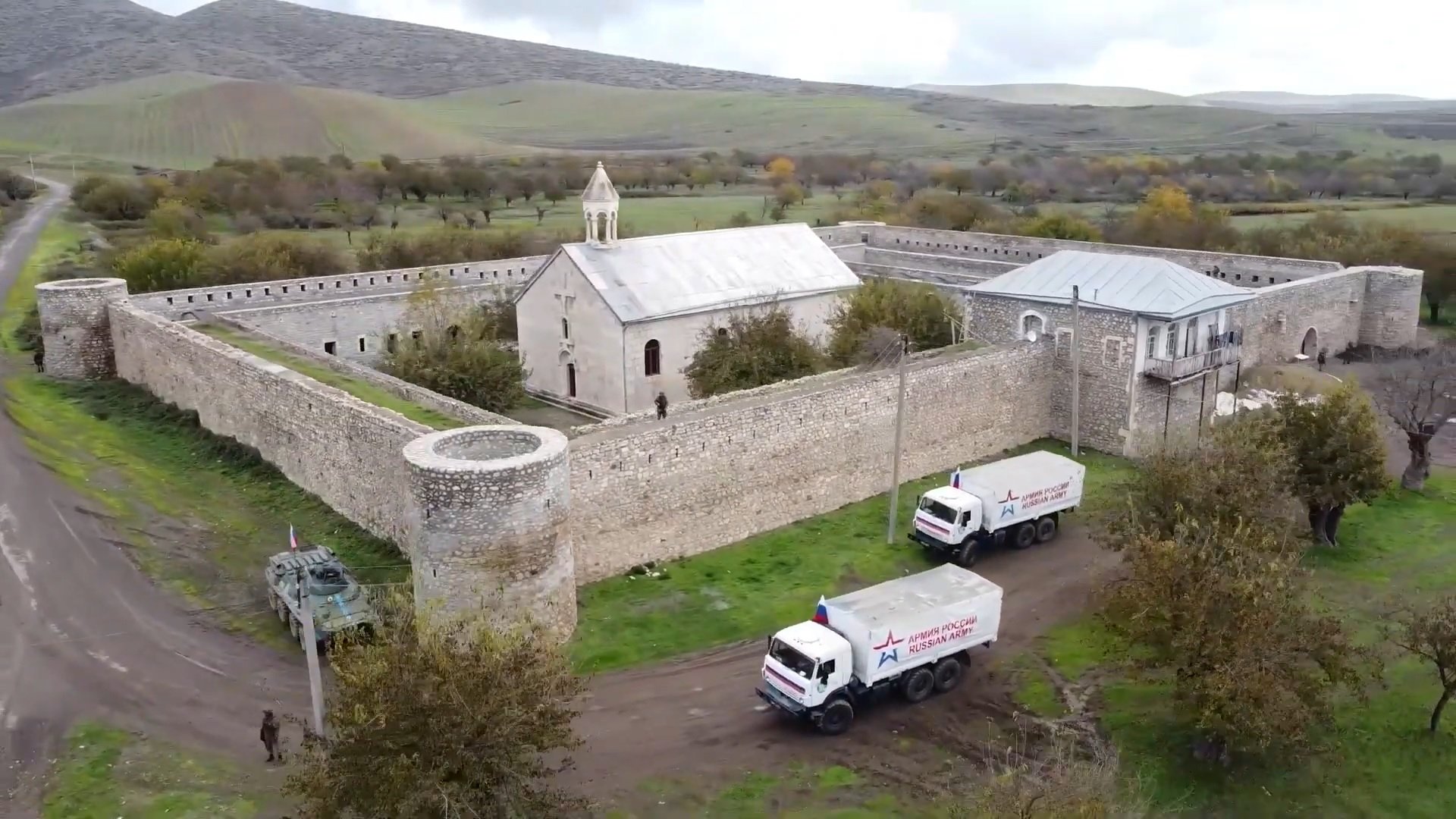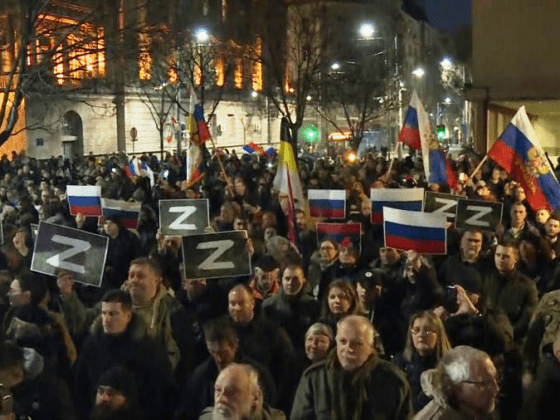Two years have passed since the end of the 44-day Karabakh War and the Russian-mediated trilateral agreement on November 10, 2020. Even though the agreement ended the intense military actions between Azerbaijan and Armenia, the sides are still without a comprehensive peace deal. In these two years, relations between Baku and Yerevan have swung from military clashes and hundreds of casualties to fruitful meetings between officials and heads of state. However, this past September, violent escalations left dozens dead on the borderlands, showing the fragility of the situation and the urgent need for a lasting peace arrangement.
The Russian invasion of Ukraine has created a new situation in the region. It has slowed down reconciliation between Baku and Yerevan (and others in the region), added new factors to diplomatic relations, and changed perceptions about Russia in neighboring post-Soviet states. The new conditions have created both challenges and opportunities for Armenia and Azerbaijan. On a small positive note, both sides met to address and solve Karabakh water distribution issues. Further, Azerbaijan has become a stable and reliable energy partner for the EU, and a key player in the transportation of energy resources from Central Asia toward Europe. Meanwhile, heavily sanctioned Russia is eager to use Azerbaijan as a transportation corridor for north-south trading with Turkey and the Global South.
The Struggle Over Principles of Peace
The trilateral agreement left some crucial issues unresolved. These include, most obviously, delimitation and demarcation of the borders between the war parties. The agreement envisioned future discussions and solutions on this matter by both sides. However, Baku and Yerevan see the principles of a future peace agreement differently.
Baku sees the conflict finished after its military victory in Karabakh and has invited Armenia to cooperate and open borders. During a one-on-one meeting with European Council President Charles Michel, President Ilham Aliyev voiced his five main principles for a peace agreement:
- Recognition of the territorial integrity of both countries.
- Mutual dropping of territorial claims.
- Non-use of force or threats of force.
- Delimitation of borders.
- Opening of communications.
Based on these principles, Baku sees the issue of Armenians of Karabakh as an internal matter and no international meddling should be implemented here. Furthermore, Azerbaijan no longer believes in a role or need for the OSCE Minsk group, which was established 30 years ago to help resolve the Nagorno-Karabakh conflict, since Baku considers the conflict over. From the same perspective, Baku hopes to limit the role of the Russian peacekeepers, eventually asking them to leave in 2025.
For its part, Armenia has been strongly concerned that recognizing Azerbaijan’s (new) territorial integrity means ending Yerevan’s involvement in Karabakh affairs and abandoning the Armenians living there. Therefore, Armenia wants a peace agreement that includes protections for the rights and freedoms of Karabakh Armenians. Yerevan has also been worried about opening transportation links. For years, Baku has proposed connecting mainland Azerbaijan with its Nakhchivan exclave and on to Turkey. This transportation route, called the Zangezur Corridor (or Nakhchivan Corridor), would speed up the delivery of goods from China, Central Asia, and even Russia to Turkish markets and the Mediterranean region. Once it becomes operational, it will connect Turkey directly with mainland Azerbaijan through Armenian territory along the Aras River by both road and rail. (See maps of the Corridor by the Andalou Agency (2021) and TRTWorld (2022)).
That route was supposed to be a faster and cheaper alternative to the Georgian-Black Sea one. The corridor would benefit Azerbaijan, Turkey, and Armenia, allowing Yerevan to exit its transportation deadlock and access world markets. Nevertheless, the Armenian side is fearful that the project would cut off Armenia from Iran. In response to such concerns, in November 2021, the Deputy Prime Minister of Russia and the co-chair of the trilateral task force dealing with cross-border connections, Alexei Overchuk, provided reassurance that “Armenia and Azerbaijan will retain sovereignty over roads passing through their territory.”
While Moscow has most of the tools of influence in the region, Brussels is also interested in promoting a lasting peace between the two Eastern Partnership countries. The leaders of Azerbaijan and Armenia have met several times in Brussels, slowly bringing their positions closer to each other through small steps. The leaders participated in meetings mediated by the EU in Brussels in April, May, and August of this year.
In the May meeting, Armenian Prime Minister Nikol Pashinyan and Aliyev agreed on the basics of the transit routes, including the Zangezur Corridor, and on the formation of a border planning committee. During the August meeting in Brussels, the parties discussed the conditions for unblocking transportation communications and agreed to intensify border delimitation. After the meeting, Baku released five captured Armenian citizens that it said were originally saboteurs.
Meanwhile, in Karabakh, which is administered by Russian peacekeepers, some positive developments are happening that lay the groundwork for more peace. According to the main provisions of the trilateral agreement, Armenia promised to withdraw from the city of Lachin and surrounding villages, giving control to Baku once a new alternative road connecting Armenia and Karabakh is constructed. Baku built this 32-kilometer-long road in a record 1.5 years, and the Russian peacekeepers have agreed to pass control of the Lachin region to Azerbaijan smoothly.
Some positive progress also happened on August 22, 2022, when Azerbaijan’s water management agency began to cooperate with local Karabakh-Armenian experts on water-sharing plans. The group met and monitored the Sarsang water reservoir together. Such a development is small, but it may greatly impact building trust and confidence.
Nevertheless, September 12-14 military clashes on the border between Azerbaijan and Armenia showed the problems with a peace agreement again. Both sides accused each other of escalation, while the Armenian side claimed that the Azerbaijani army had intruded on its territory. Meanwhile, Baku stressed the absence of clear borders, so military activities happened on Azerbaijan’s territory. Yet, the clashes made headlines and seriously degraded the path toward peace and reconciliation.
The Ukrainian Crisis and Its Implications
The Russian invasion of Ukraine has shuffled dynamics in the South Caucasus and Eurasia overall. Baku was confronted with a new reality after the outbreak of the war, with hard security again becoming the most pressing issue. The war revealed the high degree of vulnerability of many post-Soviet states emanating from the Russian dominance of post-Soviet Eurasia. With limited foreign policy options, Baku gave only a modest reaction to the Russian invasion of Ukraine, while Moscow strove to keep its strong tools affecting Armenia and Azerbaijan. All in all, Azerbaijan did not want to irritate Russia and responded with as balanced an approach as it could. The main ramifications on the foreign policy of Azerbaijan are reduced space and increased costs/risks of maneuvering.
The invasion continues to affect the calculations of the Baku government, and it has tried to update its policies toward Moscow, Brussels, London, Washington, Ankara, Tel-Aviv, Beijing, Tehran, Tbilisi, and Yerevan. Rather unexpectedly, the Ukrainian crisis became a sort of reset point for Azerbaijan, with some unknowns. Moscow could become more aggressive, and its policy toward Karabakh and Azerbaijan can change toward higher Russian dominance. If Russia weakens, feeling its political and economic limitations, Baku may face new challenges, unpredictable situations, and opportunities.
Depending on Azerbaijani reactions and actions, Russia could sporadically create a situation in which pro-Russian Armenian separatists hunt and haunt Azerbaijanis, or sabotage negotiated solution efforts, threatening stability across the region. Furthermore, if other countries deepen their sanctions against Russia, or if the war becomes more negative for Moscow, Russian policies in the region could be impacted in unpredictable ways, making the regional environment vulnerable and fragile.
Nevertheless, amidst the energy crisis in Europe, Baku signed a memorandum of understanding with the European Commission to double Azerbaijani natural gas from the current 10 to 20 billion cubic meters (bcn) by 2027. Even though such volume is not enough to substitute for Russian gas exports to Europe, this is the first serious intention expressed by Brussels to diversify away from Russian gas toward Azerbaijani sources—and possibly also from Turkmenistan. The memorandum seeks to significantly expand bilateral ties across a wide spectrum of the energy field. Baku does not hide its intention to use the gas deal to deepen relations with the EU, which could be the key to Azerbaijan’s success in reconstruction efforts in Karabakh. Azerbaijan is actively continuing its reconstruction process in the “liberated” territories. According to Azerbaijan’s 2022 state budget planning, $1.6 billion is being invested in ongoing and new reconstruction projects this year. Baku has already launched major infrastructure projects in Karabakh and invited foreign investors.
In addition, due to the crisis, Azerbaijan is poised to play a greater role in the transportation of crude oil, namely from Kazakhstan. Currently, two-thirds of Kazakhstan’s crude exports, representing more than 1 percent of global supply, flow through the Russia-controlled Caspian Pipeline Consortium (CPC) pipeline. Given Kazakhstan’s vocal refusal to support Moscow’s attack on Ukraine, CPC operations have been interrupted four times. Kazakhstan’s state oil company, KazMunayGas, has been negotiating with the State Oil Company of the Azerbaijan Republic, SOCAR, on a deal to transport 1.5 million tons of crude per year through Azerbaijan’s Baku-Tbilisi-Ceyhan pipeline. Moreover, Kazakhstan plans to export 3.5 million tons of crude per year from 2023 through the Baku-Supsa pipeline to Georgia. Even though Kazakh Energy Minister Bolat Akchulakov rejected the idea of re-orienting oil supplies from the CPC to Azerbaijani pipelines, the realization of such a scenario is feasible. Azerbaijani pipelines have already transported Kazakh crude. In 2020 and 2021, about 10,000 tons of Kazakh crude per month flowed to markets via the Baku-Tbilisi-Ceyhan pipeline.
Conclusion
As the Ukraine war deepens on the evolving geopolitical landscape, so do contradictions and discord between Russia and the West. Several spillover scenarios can be foreseen:
- Russia’s weakening position in the South Caucasus (and beyond). Such a situation can also be problematic for the countries in South Caucasus, bringing new challenges. For the whole history of post-Soviet Russia, countries in the South Caucasus have never dealt with weakened Russia, and such a new scenario has its own problems
- The intensified rivalry between the West and Russia over the South Caucasus. The new line of opposition between the collective West and Russia may pass through the South Caucasus, making the region another hotbed area.
- Preservation of Russia-centered configurations, particularly in Karabakh. Russian peacekeepers will stay in Karabakh after 2025, and Baku will need to take into consideration Moscow’s interests in the region.
- Replacement of Karabakh arrangements with European-centered configurations. A weakened Russia will be replaced by EU peacekeeping, bringing new breath to reconciliation efforts.
The war generally weakens Armenia’s position and strengthens Baku’s stance in Karabakh. With the defeat in Karabakh, Yerevan tries to exit the conflict with minimum losses in internal and foreign politics. Meanwhile, on the diplomatic front, the EU seems to be the best candidate to emerge as an alternative mediation platform for peace talks to reduce the mostly Russian-led process. On the positive side, Baku is emerging as a reliable energy supplier for the EU. Its geographical location increases Azerbaijan’s strategic importance for energy resources, not only for the West but also for Russia and China. It can also strive realistically to be a connectivity hub for multiple actors, particularly after the sanctioning of Russian railways, which has been a major transporter. On the negative side, Azerbaijan will be part of a worsening zero-sum game between Russia and the West, tightly testing its balanced foreign policy approach.
Anar Valiyev is Associate Professor at ADA University, Baku, Azerbaijan.
Inara Yagubova is a Research Fellow at the Institute for Diplomacy and Development, Baku, Azerbaijan.











